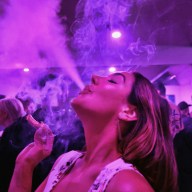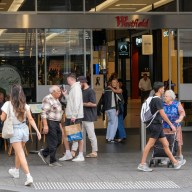By Andrew Cawthorne and Francisco Aguilar
CARACAS/BARINAS, Venezuela (Reuters) – During his 2013 presidential campaign, Nicolas Maduro opened rallies with an emotional recording of Venezuela’s national anthem sung by the recently-deceased Hugo Chavez.
In a strategy that earned him a narrow victory, Maduro surrounded himself with images of the popular former president, played footage of his socialist mentor anointing him as successor, and proclaimed himself “the son of Chavez.”
This time around, in a strangely unanimated presidential race boycotted by the mainstream opposition, Maduro has deliberately relegated the Chavez props.
Ignoring his personal unpopularity, fueled by rising hunger and violent crime as the oil-reliant economy implodes, the 55-year-old former bus driver and foreign minister has placed himself front-and-center of the campaign for the May 20 vote.
At rallies, he dances to a catchy reggaeton tune “Todos con Maduro” (Everyone with Maduro), amid huge ‘M’ banners on stage.
Crowds wave pictures of his beaming mustachioed visage, albeit sometimes with Chavez’s face floating above him.
“Our commander (Chavez) left us, but we must carry on the fight, don’t leave me alone!” Maduro implored at a recent rally. “Five years ago, I was a novice candidate. No more. Now I am a mature president, ready, experienced, with the balls to confront the oligarchy and imperialism.”
Maduro’s approach seems a bold one. Polls show the defunct Chavez is still the most popular political figure by far, while the incumbent president’s own ratings have sunk – along with Venezuela’s economy.
Yet the strategy reflects Maduro’s absolute confidence of winning a new six-year term.
And why not? The two most popular opposition figures are barred from the election, state resources are at his service, loyalists control potentially pesky bodies like the judiciary and election board, and the opposition has split bitterly over whether to abstain from the vote.
Furthermore, within the ruling “Chavismo” movement, Maduro outmaneuvered would-be rivals, such as powerful party No. 2 Diosdado Cabello, to make his candidacy a fait accompli.
Maduro’s consolidation of power began with the 2017 defeat of opposition protests, then a purge this year of former Chavez loyalists critical of him, like former oil czar Rafael Ramirez.
Now Maduro wants to drive home the advantage, trying to establish his own brand above government power struggles.
OPTIONS LIMITED
“For good or for bad, Maduro is the only major political figure on the scene right now,” said Hebert Garcia, a former general and minister who split with Maduro several years ago.
“So this election is like putting an image in front of someone and saying ‘choose’ – but there’s no one else to choose from!” he said from the United States, where he works as a consultant, evading corruption charges by the Maduro government.
There are several other names on the ballot sheet – former state governor Henri Falcon and evangelical Christian pastor Javier Bertucci being the most prominent. But many opposition supporters see them as stooges and “collaborators” participating in a sham to legitimize Maduro’s “dictatorship.”
Some polls actually give a lead to Falcon, who broke with the mainstream opposition’s boycott of the vote.
But the widespread abstention anticipated, Maduro’s formidable political machinery, the vote-winning power of state handouts, coercion of government employees, and the pro-Maduro makeup of the election board make Falcon’s task Herculean.
As confident as Maduro may appear right now on the political stage, his Achilles Heel remains the economy.
Venezuela is suffering a fifth year of recession with a double-digit contraction expected for 2018, inflation is the highest in the world, and the minimum monthly salary is worth barely $2 at the black market exchange rate.
Scarcity of food and medicines is widespread, and hundreds of thousands have left the country in recent years – increasingly by foot, bus and even bicycle.
CRISIS MAY DEEPEN
So Maduro will still have a crisis on his hands even if he wins. Washington is threatening to add oil sanctions to existing measures to stop Venezuela from issuing new debt, while restive creditors are considering more aggressive tactics.
There are no signs of reforms to the failing state-led economic model.
Maduro’s campaign mantra is to blame everyone from U.S. President Donald Trump to the local business community for the economic mess, ignoring the damage caused by botched nationalizations and dysfunctional currency controls.
Apart from promising a Utopian economic “rebirth”, he has given few details on his post-election plans. Many fear further retrenchment and moves against business such as last week’s 90-day seizure of the nation’s largest private bank.
Maduro’s election rallies around the country are notably smaller, more strictly corralled and shorter than in 2013. Away from the obediently ecstatic front rows, there is plenty of grumbling by unhappy Venezuelans.
“It’s the most flavorless and colorless campaign for at least 20 years,” scoffed former oil minister Ramirez, who had wanted to stand as the candidate of “Chavismo” but is instead in exile in an undisclosed foreign location.
At one recent campaign rally in Barinas state, flustered organizers hit the phones to try to boost numbers. A visibly irritated Maduro blamed poor turnout on rain – even though it only started falling after the event, witnesses said.
“I came to see what he would say about fixing the economy,” said Aparicio Teran, a 49-year-old peasant farmer, who like many in the agricultural savannah state is struggling for lack of bank loans, pesticides and cattle feed.
“I’m leaving without hearing anything about credits, fertilizers, herbicides, fungicides, food for the cows. We can’t go on like this. All we can look forward to is hunger.”
Though food has become Venezuelans’ No. 1 worry, many see no option but to vote for Maduro – in part to guarantee receiving state-subsidized food bags that millions depend on.
And Maduro still has core support among about one-fifth of Venezuelans, who swear loyalty to Chavez’s legacy come what may.
“The entire people is fighting for its future, against the destructive policies of U.S. imperialism and its European allies, against the blockade (sanctions) and against the economic war,” said Carlos Marquez, 24, in Barinas, wearing the red cap and T-shirt associated with diehard “Chavistas.”
(Additional reporting by Girish Gupta; Writing by Andrew Cawthorne; Editing by Alexandra Ulmer, Daniel Flynn and Paul Simao)


















